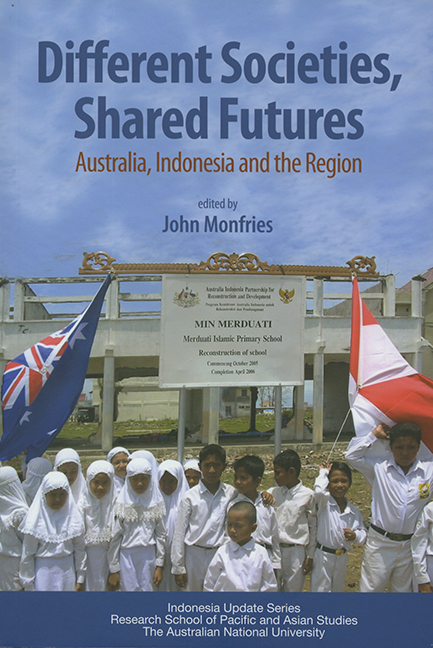Book contents
- Frontmatter
- Dedication
- Contents
- Tables
- Figures
- Contributors
- Acknowledgments
- Opening Address by Richard Woolcott AC
- 1 Introduction
- PART I Regional Viewpoints
- 2 An Indonesian View: Indonesia, Australia and the Region
- 3 A Regional View: The Garuda and the Kangaroo
- 4 An Australian View: The Outlook for the Relationship
- PART II Security Aspects
- PART III Mutual Perceptions and Irritations
- PART IV The Economic Partnership: Aid, Economics and Business
- PART V Conclusion
- Glossary
- References
- Index
3 - A Regional View: The Garuda and the Kangaroo
from PART I - Regional Viewpoints
Published online by Cambridge University Press: 21 October 2015
- Frontmatter
- Dedication
- Contents
- Tables
- Figures
- Contributors
- Acknowledgments
- Opening Address by Richard Woolcott AC
- 1 Introduction
- PART I Regional Viewpoints
- 2 An Indonesian View: Indonesia, Australia and the Region
- 3 A Regional View: The Garuda and the Kangaroo
- 4 An Australian View: The Outlook for the Relationship
- PART II Security Aspects
- PART III Mutual Perceptions and Irritations
- PART IV The Economic Partnership: Aid, Economics and Business
- PART V Conclusion
- Glossary
- References
- Index
Summary
Much has happened since the last Indonesia Update conference in 2004. Indonesia has a new president; he has settled well into his challenging post, appointed his cabinet and launched a series of reforms, including the politically sensitive action of raising fuel prices in September 2005. More tragically, the December 2004 tsunami caused tremendous loss of life and extensive damage and destruction in Indonesia and several other countries. The president and the government of Indonesia have risen to the great challenge of rebuilding Aceh, and many countries, including Australia, have offered significant humanitarian help. Indonesia continues to battle acts of terrorism such as the latest bombing in Bali, with the help of other countries, but the threat keeps mutating along with the loose alliances of extremist groups. With so many political, economic, security and social changes, it is timely to reflect on a key bilateral relationship: that between Indonesia and Australia.
FACTORS IN REGIONAL VIEWS
There are several factors that influence national perceptions of the Indonesia–Australia relationship. While all members of the Association of Southeast Asian Nations (ASEAN) would acknowledge the salience of this relationship, geographic distance would diminish its importance for some members: the further away, the less its importance. Those ASEAN countries that share a land or maritime border with Indonesia, such as Malaysia, Philippines, Brunei and Singapore, would understand better the consequences of good or bad relations between the two giants to their south. There is, after all, an immediacy that adds reality to abstract notions of neighbourliness when two other neighbours start quarrelling on your doorstep.
A second factor is ASEAN solidarity; for better or for worse, when a fellow club member is engaged in a dispute with an outsider, one's immediate reaction is to express sympathy with the fellow club member. After all, if the same thing happened to us, we would expect regional sympathy and solidarity from other club members. The problem of course is this: what if, like Singapore, you are a member of several clubs, such as ASEAN, Asia-Pacific Economic Cooperation (APEC), the Commonwealth, the Non Aligned Movement (NAM) and the G77, and the numerous ties that link you to both sides pull you in opposite directions? The solution then might be to try and help settle the dispute and/or offer sympathy and support to both, without appearing two-faced. This is the essence of diplomacy.
- Type
- Chapter
- Information
- Different Societies, Shared FuturesAustralia, Indonesia and the Region, pp. 20 - 33Publisher: ISEAS–Yusof Ishak InstitutePrint publication year: 2006



